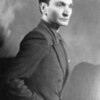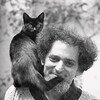Emmanuel Bove (1898–1945)
Author of My Friends
About the Author
Emmanuel Bove (1898-1945) was born in Paris. With Colette's patronage, he became a popular writer, dividing his career between pulp fiction and the handful of serious novels upon which his reputation now rests.
Works by Emmanuel Bove
Plankenkoorts 3 copies
Past 1 copy
Un Autre ami 1 copy
Aftalion, Alexandre suivi de Refus d'inhumer de Raymond Cousse sous jaquette Meublé sommairement. 1 copy
19 Oeuvres majeures : Mes Amis, Départ dans la nuit, Le Pressentiment, Le Meurtre de Suzy Pommier, L’Amour de Pierre… (2019) 1 copy
L'Histoire d'un fou 1 copy
Petits contes 1 copy
Le remord 1 copy
Tagged
Common Knowledge
- Legal name
- Bobovnikoff, Emmanuel
- Other names
- Vallois, Jean (pseudonym)
- Birthdate
- 1898-04-20
- Date of death
- 1945-07-13
- Gender
- male
- Nationality
- France
- Birthplace
- Paris, France
- Place of death
- Paris, France
- Places of residence
- Paris, France
- Education
- Lycée Calvin de Genève
- Occupations
- writer
novelist
journalist
translator - Short biography
- Emmanuel Bove was born Emmanuel Bobovnikoff in Paris to a Jewish father who had emigrated to France from Ukraine and a Luxembourgish mother. He had a brother, Leon. Emmanuel studied at the Lycée Calvin in Geneva, Switzerland. In 1915, he was sent to boarding school in England, where he completed his education. Returning to Paris, he fell into extreme poverty and even served a month in prison for vagrancy. In 1921, he married Suzanne Vallois and moved to the suburbs of Vienna. There he began his literary career, publishing numerous popular novels under the pseudonym Jean Vallois. He went back to Paris again in 1922 and took work as a journalist and translator. His writing came to the attention of Colette, who helped him publish his first novel under his own name, Mes amis (My Friends) in 1924. The novel was a success and won the Prix Eugène Figuière in 1928.
In 1940, at the start of World War II, Bove was mobilized as a laborer. He was unable to publish during the Nazi Occupation of France, and managed to flee the country in 1942 to Algiers. There he wrote his three final novels: le Piège, Départ dans la nuit, and Non-lieu. Following the liberation of Paris, Bove returned once more but in poor health from illnesses caught during his exile. He died at age 47 on July 19, 1945.
Members
Reviews
Lists
Awards
You May Also Like
Associated Authors
Statistics
- Works
- 60
- Members
- 1,033
- Popularity
- #24,928
- Rating
- 3.9
- Reviews
- 19
- ISBNs
- 196
- Languages
- 15
- Favorited
- 5
















Frasi molto semplici e poco articolate come gli intratitoli che intervallavano un tempo lo svolgersi delle vicende.
E, in effetti, la poesia perfusa da questo struggente racconto breve rimanda a quella di un film muto.